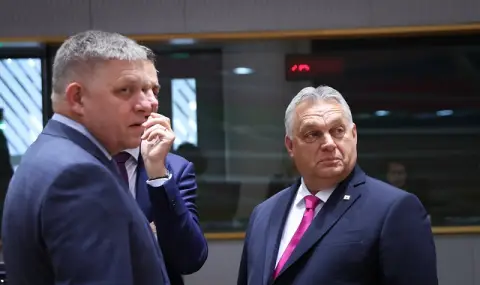Far-right favorites to win next election in Austria have forged an alliance with Hungarian leader Viktor Orbán that could lead to increased opposition to Brussels and threaten the already fragile consensus on the war in Ukraine if they come to power.
Orban, prime minister of Austria's old imperial partner and an ally of US presidential candidate Donald Trump, has often blocked or delayed major European Union decisions, such as sanctions against Russia and aid to Ukraine, extracting concessions from the block.
While other hard-line nationalists who head European governments have taken a more moderate course, Austrian Freedom Party (AFP) leader Herbert Kickl has turned his political power into a close ally of Orban, a self-described supporter of "illiberal democracy".
"We are entering a new era in European politics," Kickle said when Orban announced their alliance at the European level in June at a Vienna hotel, which also included Andrej Babis, the leader of the largest party in the lower house of the Czech parliament and former Prime Minister of the Czech Republic.
Other parties, including the French "National Assembly" of Marine Le Pen, soon joined the coalition, which became the third largest political group in the European Parliament.
A government led by Austria's Freedom Party would deepen the difficulties Europe faces in staying united in providing arms and aid to Kiev and in opposing actions such as Orbán's trip to Moscow last month, which angered representatives of the EU.
Kikkel, who has described European Commission President Ursula von der Leyen as "belligerent", said last month that he and Orban were calling for a "peaceful solution to the war between Ukraine and Russia", referring to the speech to Pope Francis that Kiev must have the "courage to wave a white flag" in order for peace to be negotiated.
The Vatican later said that Russia must first end its aggression for any talks to take place.
Pressure on Ukraine to come to terms with Russia is also coming from Slovakia, which, like the Czech Republic, was once part of the Austro-Hungarian Empire that dominated central Europe before the First World War.
Slovak Prime Minister Robert Fico, who maintains friendly relations with Moscow, ended military aid to Kiev and opposes Ukraine joining NATO. However, he did not join the coalition formed by Kickel and Orban, whom the Austrian far-right had long courted.
Fico, who is on the political left, said his party would not be part of the main centre-left group in the European Parliament after its membership was frozen in October due to the formation of Slovakia's ruling coalition with a far-right party.
Neutral Austria is not sending weapons to Ukraine, and the ongoing business relationship between one of its largest banks and Russia worries Washington. It still imports most of its natural gas from Russia despite attempts to diversify.
The European Union has agreed to 14 sanctions packages since Russian forces invaded, and in February approved a €50 billion aid package for Ukraine until 2027.
The frequent threat of a Hungarian veto has forced the 27-member bloc to get inventive and resort to unconventional tactics. At a meeting of leaders in December, Orbán was asked to leave the room so that the start of membership talks with Ukraine could be approved.
"I think it will be increasingly difficult to accept further sanctions. If a government of the Austrian Freedom Party comes, then it will not be only Orban. Then Austria will potentially be one of the veto-imposing countries," says Paul Schmitt, head of the "Austrian Society for European Policy" think tank.
TUNE-UP AGAINST BRUSSELS
Like its European partners, the Austrian Freedom Party has combined tough rhetoric on immigration and Islam with promises to curb what it sees as Brussels' interference in national affairs.
Senior party officials declined or did not respond to requests for an interview for this article. "As an Austrian party, we only focus on Austrian media and agencies in our communication work," said a spokesman for the Austrian Freedom Party.
The Hungarian government did not respond to a request for comment. A spokesman for the European Council said it would not speculate on the outcome of the election, but noted it would work with any force chosen by Austria. The commission declined to comment.
Like Orbán, who says Trump plans to quickly broker peace in Ukraine if re-elected in November, the Austrian Freedom Party has criticized EU support for Ukraine and sanctions against Russia.
Polls have long shown that the Austrian Freedom Party will come in first and overtake Chancellor Karl Nehhammer's conservative Austrian People's Party.
But even if it wins the parliamentary elections in September, the Austrian Freedom Party will face serious obstacles to leading a government for the first time.
Austria's Freedom Party, currently tipped to get around 27% of the vote, will need a coalition partner to govern. The only realistic option is the Austrian People's Party. However, Nehammer ruled out cooperation with Kickle, but not with APS.
President Alexander van der Bellen, a former leader of Austria's Greens who is a supporter of EU unity on Ukraine, has hinted that he would not agree to Kickle becoming chancellor.
Kikkel's opponents accuse the APS, which in 2016 signed a cooperation agreement with Vladimir Putin's "United Russia" party, of carrying out the will of Moscow.
Austria's Freedom Party says it is the only political force that takes Austria's neutrality, which is enshrined in the constitution, seriously. The party invokes neutrality to attack policies aimed at Russia, such as a planned missile defense system stretching from Britain to Turkey.
Many Austrians profess the belief that by not provoking world powers, such as Russia, they guarantee their security. Polls show that there is a convincing majority of voters in Austria who want the country to remain neutral.
In this regard, Kickle emphasizes that his policy regarding Ukraine is related to threats to Austrian neutrality, not admiration for Putin. "The explanation is strictly related to domestic politics," says political analyst Thomas Hofer.
Translation: Bozhidar Zahariev, BTA
